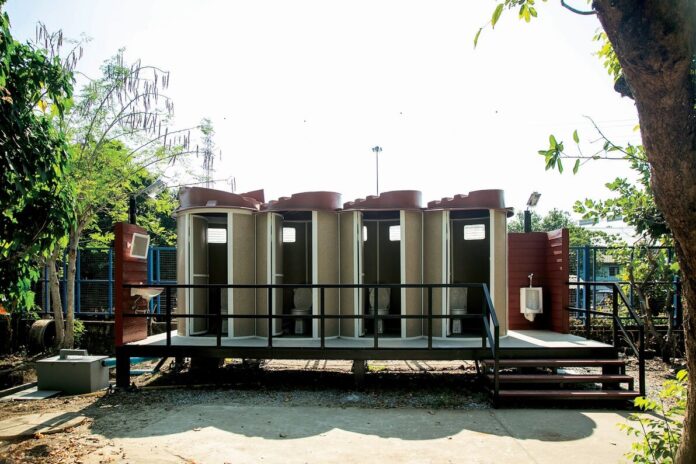Thai industrial group SCG has been working to evolve its range of non-sewered sanitation options, writes Attawut Kumkrong.
With many places in the world facing a sanitation crisis in which human waste goes untreated, polluting natural water resources and spreading diseases in local communities, there are organisations working to innovate a sustainable solution for this problem and raise the quality of people’s lives.
The sanitation enterprise Zyclonic was established by the Chemicals Business of SCG, one of the largest integrated petrochemical companies in Thailand. It is a key industry leader in Asia committed to conducting business in line with environmental, social and governance (ESG) critera and achieving the UN Sustainable Development Goals (SDGs).
The aim of Zyclonic is to design, develop and implement ISO 30500-standard, pathogen-free non-sewered sanitation (NSS) solutions in Thailand, Southeast Asia and the rest of the world.
Zyclonic started with the Zyclone Cube. This all-in-one, on-site solid and liquid human waste treatment system utilises patented waste separation and biological, electrochemical and thermal disinfection technologies and processes, along with an SCG bio-scrubber to provide an odourless system. The NSS system was jointly developed using scientific research from the Asian Institute of Technology (AIT) and commercial expertise from Chemicals Business, SCG. The Zyclone Cube was designed to efficiently treat and transform both solid and liquid waste into reusable pathogen-free by-products: a soil conditioner to support growth of plants, and clean water suitable for toilet flushing or irrigation.
“In sanitation, one size does not fit all, and technology acceptance takes time and effort”
A relatively uncomplicated and compact solution, the Zyclone Cube provided a treatment system suitable for small school or community restroom blocks in warm climates such as Thailand. The device was demonstrated within a local, low-income Bangkok community (Khlong Phlabphla, Rama IX) in 2019, treating sludge from four cubicles and a urinal set up on a community recreation ground. The restrooms were mainly used in the morning and evening, when community residents were out exercising and socialising.
Meeting ISO 30500 requirements, key treatment performance test results over nine months included a 99% reduction in total suspended solids and a 6-log reduction in E.coli for the liquid treatment stage, and greater than 99% reduction in total volatile organic carbon for the solid treatment stage.
The Zyclone Cube was a clever idea but was not as practical as expected in real-world scenarios beyond a Khlong Phlabphla-type application. The design was found to be too constrained and inflexible. This restricted the situations where it could be installed and its
customer/user base. Moreover, it was too novel compared to what already existed in the market for it to comfortably replace or work alongside established systems, set-ups and practices.
In Thailand – and many countries in Southeast Asia – NSS typically means an underground septic tank. Most households in Thailand use mass-produced, two-chamber, plastic, roto-moulded septic tank designs. These are cheap and effective solutions for storing untreated waste. However, they are not ideal, because they fill up rapidly. Also, liquid effluent is allowed to discharge directly into the ground, polluting local waterways, although Thailand and other countries in the region are cleaning up their act, with new regulations being enforced to stop this practice by requiring effluent to be treated and pass quality standards before discharge.
New modular approach
Addressing these difficulties and regional user behaviour, Zyclonic changed its strategic direction to design and develop modular systems that offered flexibility and could be integrated step-by-step alongside familiar septic tanks. In doing so, Zyclonic recognised that different users and scenarios have very different needs, wants, demands, and budgets. In sanitation, one size does not fit all, and technology acceptance takes time and effort. Evolution rather than revolution is required.

The new modular way of thinking has been executed at a gas station restroom installation in Thailand. The treatment technology of the Zyclone Cube has been deconstructed, reconfigured, and resized to work alongside two large-volume septic tanks serving a 24-hour operational restroom block of 26 pedestal toilets and 12 urinals. Four toilets are directly connected to solid and liquid treatment technologies, while the remaining 22 toilets and urinals connect to the septic tanks. From the septic tanks, blackwater effluent is pumped and treated daily by two 600-litre liquid treatment tanks. It is not a complete on-site treatment solution but is essentially fail-safe, reduces the frequency that the septic tanks need to be emptied, and ensures that discharge effluent from the septic tanks is treated to achieve ISO 30500-standard, reusable water quality.
“Zyclonic recognised that different users and scenarios have very different needs, wants, demands, and budgets”
The liquid treatment unit, known as Aquonic, was developed and commercialised for improving the effluent water from the septic tank to comply with ISO 30500-standard quality at an affordable cost to users. It responds to the strengthening of pollution control acts in the Southeast Asia region, which created the liquid treatment tank’s market opportunity for treated, pathogen-free recycled water. The successful case in Thailand is now being transferred to official testing sites in South Africa. Zyclonic is also currently setting up a range of similar hybrid, flexible systems that offer solid and liquid treatment and liquid-only treatment in an assortment of scenarios and volume capacities in many countries. •
More information:
See: www.scgchemicals.com/en/products-services/technology-solutions/reinvented-toilet-total-solution
Attawut Kumkrong is Head of Reinvented Toilet Business, SCG Chemicals, Thailand








